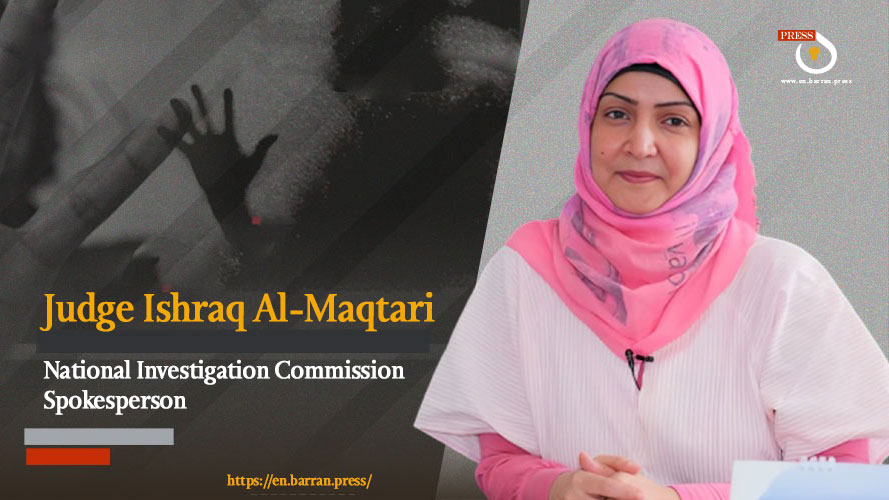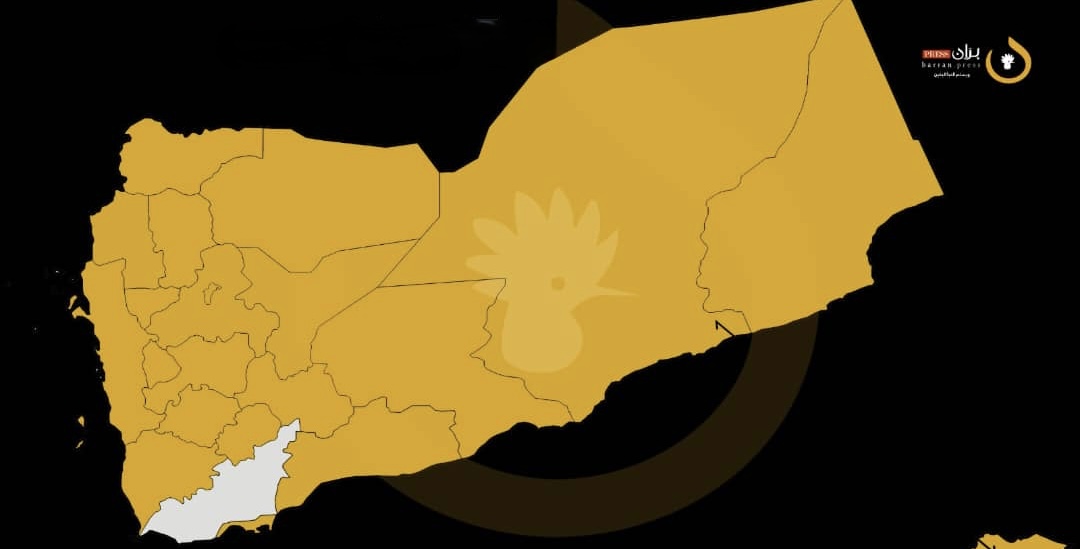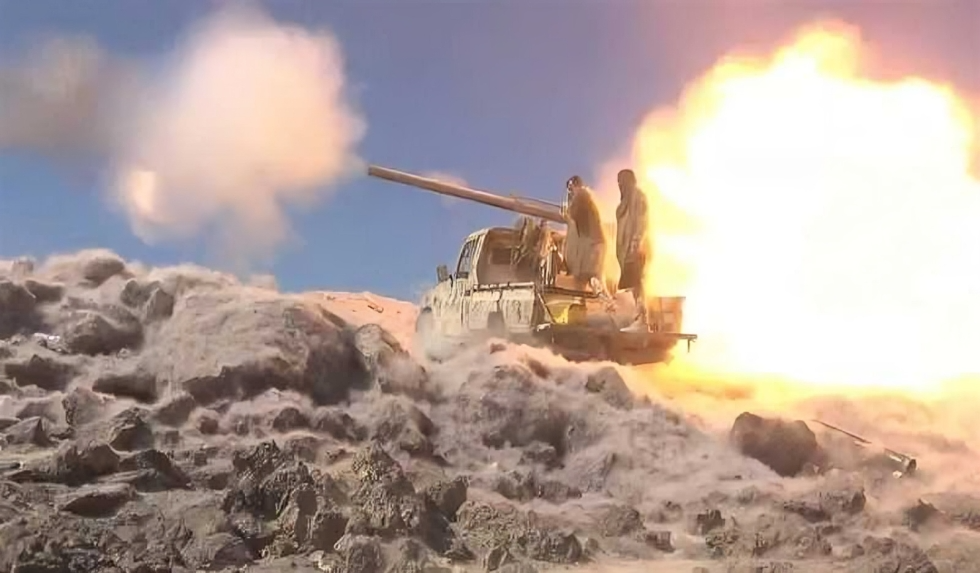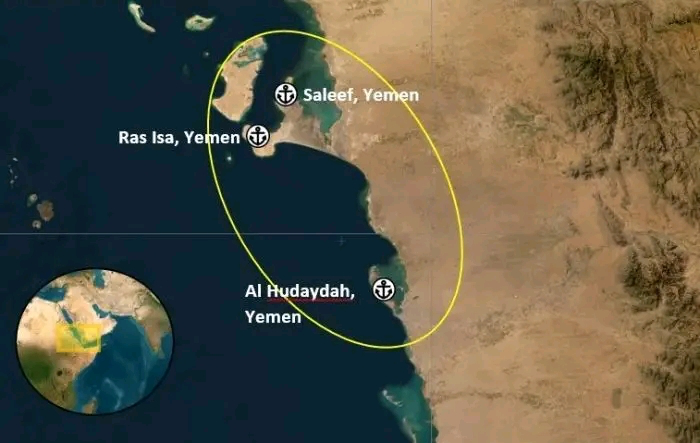
Barran Press
Judge Ishraq Al-Maqtari, a member of the National Investigation Committee on Human Rights Violations, expressed her regret over the increase in human rights violations in Yemen during 2024. In a special interview with "Barran Press", she highlighted the growing boldness in committing these violations, particularly by the Houthi group, globally recognized on terrorism lists.
Despite international and regional efforts to establish peace in Yemen, 2024 witnessed a further escalation of violations, including intensified repression, discrimination, and exclusion, especially against women and children. Al-Maqtari, an expert in international human rights protection mechanisms and transitional justice, outlined the committee's key achievements in 2024 and the major violations documented during the UN-brokered humanitarian truce, along with the challenges faced in monitoring and documentation.
She discussed the committee's reports submitted to the Public Prosecutor's Office, explaining the delays in investigations and the pursuit of those responsible for human rights violations. Al-Maqtari also addressed the UN pledges to support and enhance the committee's technical and professional capabilities through the High Commission for Human Rights, and the commission's stance on the committee's existence and activity, including potential moves to replace it with an international investigation mechanism.
When asked about the committee's role given the lack of direct impact of its field investigations on human rights and victim compensation, Al-Maqtari emphasized the importance of its work in raising awareness and documenting violations.
Interview Highlights:
- Can you describe the human rights situation in Yemen during 2024?
Firstly, I thank "Barran Press" for its interest in the human rights issue in Yemen and for raising awareness both domestically and internationally about the violations of basic rights, especially civil and political rights, as well as economic and social rights.
In 2024, despite UN and regional attempts to enforce a peace plan involving all local parties, the efforts did not translate into improved human rights conditions. Instead, the year saw a continuation of violations, including more intense repression, discrimination, and exclusion, particularly affecting women and children.
Among the notable violations were severe restrictions on women, strict surveillance, and arbitrary raids, searches, and arrests, especially in Sanaa, Al Hudaydah, and Al Mahwit. These areas witnessed significant increases in violations against women's rights to freedom, dignity, movement, and physical and psychological safety.
Al Hudaydah, in particular, saw a high number of raids and arrests, especially during Houthi campaigns alongside claims of attacks in the Red Sea or against Israel.
Another major violation in 2024 was the increased explosion of individual landmines across various parts of Yemen, which became the most significant issue after arbitrary arrests. Al Hudaydah was the most affected area, with numerous casualties from landmines planted by the Houthi group, resulting in the deaths of many civilians, especially women and children.
The year 2024 witnessed bold violations by the Houthi group, primarily through mass arrests, the shutdown of organizations, and the disappearance of employees from international and local NGOs, including embassy and UN agency staff. As of early 2025, over 110 employees remain detained since January 2024.
Despite numerous appeals and campaigns, the Houthi group has not released the detainees, with continued arrests in Al Hudaydah and Sanaa. The severe campaigns also extended to various governorates, including Ibb, Dhamar, Sanaa, Al Mahwit, Hajjah, and Al Hudaydah. These areas saw arbitrary detentions of those commemorating the 26th September Revolution, with many still detained.
For example, in Ibb Governorate, over 250 young people were detained for celebrating or writing about the 26th September Revolution, indicating increased repression by the group.
The year 2024 also saw violations against press freedom across all regions, whether under Houthi control or the legitimate government, albeit less so in the latter.
There was also an increase in restrictions on civil space, affecting websites and civil society organizations, with heightened pressures, including work cancellations or permit revocations and stricter surveillance nationwide.
We hope to find a solution to this issue by early 2025, as it will exacerbate human rights violations, and the absence of civil voices enables perpetrators to continue their abuses unchecked.
Key Achievements of the Committee in 2024 Regarding Documenting Violations and Promoting Human Rights
Throughout 2024, the committee successfully investigated over 2,100 incidents despite the challenging security and military conditions. This effort allowed the committee to reach victims, interview them, document their cases, and prepare everything necessary to help victims obtain their rights, record the facts of these violations, and identify the perpetrators.
More than 13,000 victims benefited from this documentation and investigation, with their data entered into the committee’s database, archived, and converted into legal files ready for judicial proceedings and all transitional justice mechanisms in the future.
Among the achievements is reducing violations by working with security and law enforcement institutions and contributing to the release of several detainees in the governorates of Hadramout, Marib, Taiz, and Aden. There was rigorous follow-up and direct intervention in several cases of arbitrary detention and cases delayed in judicial proceedings. Through interaction and cooperation with security and judicial agencies, victims regained their freedoms and some of their rights.
Additionally, victims were referred to economic, humanitarian, and health services, particularly for the treatment of landmine victims and those who have suffered limb amputations, through institutions that provide appropriate interventions to help victims face the consequences of the violations they endured.
The committee also engaged in listening sessions with victims, holding numerous hearings with both women and men, documenting and writing down the main patterns of violations they suffered, identifying their current and future demands, and reflecting these in the committee's reports, activities, and communications with various entities.
Key Violations Documented by the Committee in 2024 During the Declared Humanitarian Truce
Based on the committee’s investigations and field visits to conflict areas in Al Hudaydah, western parts of Taiz Governorate (Jabal Habashi, Al Wazi'iyah, and Mawza districts), and central parts of the city (Sala and Al Mudhaffar districts), these areas witnessed casualties due to shelling, sniping, and landmine explosions. These are among the most prominent violations the committee dealt with.
There were also field visits to conflict areas where the committee met with women and investigated the methodology of harm inflicted upon them, including the Houthi group’s violations of international humanitarian law and its continued shelling of these neighborhoods, putting women at risk.
Unfortunately, there were also cases of shortages and delays in delivering humanitarian aid to women, children, and other civilians in conflict areas. There was documentation, investigation, and field visits to several areas where schools were bombed, depriving children of their right to education—one of the severe violations against children prioritized by the United Nations.
These are among the primary violations the committee dealt with, confirming the ongoing shelling, sniping, landmine planting, and continued casualties and denial of aid, despite the existence of an undeclared truce.
Despite indications of a peace roadmap and international discussions and conferences, these efforts did not achieve the expected outcome of stopping these violations, particularly in war-torn areas like Ma'rib, Al Hudaydah, Hajjah, Taiz, and Al Dhale. Civilians in these governorates and their remote districts remain at constant risk from violence.
Reports Referred to the Public Prosecutor and Delays in Investigating Violations and Prosecuting Perpetrators
In 2024, there were no direct referrals of specific files. Instead, meetings were held with the Public Prosecutor’s Office, the Supreme Judicial Council, and the judiciary in the governorates to discuss cases in each governorate, progress, and delays in some cases.
Regarding the meetings with the Public Prosecutor’s Office and the Supreme Judicial Council, discussions included the establishment of the specialized court recommended by the committee, which has not yet been implemented. We also discussed previously submitted files, agreeing on the office's continued reception of these files.
As for why the investigations and prosecution of perpetrators have not begun, I believe the ball is in the court of the Supreme Judicial Council and the judiciary in general. There must be political will, a general direction, and pressure from civil society, victims, and the Victims' Association to initiate the state’s accountability and prosecution procedures, especially since there are files ready and appropriate with clearly identified perpetrators. The legal qualifications are available and clear, and the victims are eager to continue and pursue justice and prevent impunity.
Challenges Facing the Committee in Documenting Violations, Particularly in Houthi-Controlled Areas
Human rights work always faces challenges, especially with low levels of legal, human rights, and knowledge awareness. In Houthi-controlled areas, these challenges have persisted since the group took control of the capital, Sanaa, but they unfortunately increase yearly.
Currently, opportunities for documenting and investigating violations have been closed off for civil society and international mechanisms after the Houthi group expelled the Office of the High Commissioner for Human Rights and prevented those working in the field from performing these tasks.
The committee maintains a presence in all governorates with field researchers and legal experts, most of whom are from these governorates, working professionally and discreetly. Many work in secrecy to avoid harassment, having earned the trust of the community and established good relationships facilitating communication with victims.
Despite overcoming many constraints and challenges, significant challenges remain, especially the risk of detention and even death. Despite these, the committee continues its arduous and exhausting work, with researchers determined to continue performing these tasks.
Limitations of Field Monitoring Teams and Their Capabilities Despite UN Promises to Support the Committee’s Efforts
Since 2015, the committee has received an annual international resolution from the Human Rights Council to support the committee and oblige parties to cooperate with it. However, support in terms of expertise, financial, technical, assistance, and advice remains very limited.
There is also a withdrawal by the High Commissioner from fulfilling a large part of this support, but this does not mean the committee stands still or passive in the face of these other difficulties. It has the experience to continue its work.
These issues did not prevent the committee from continuing its professional and technical investigations. Experts are present in all governorates conducting investigations and reporting. The committee continues its intensive work, especially in Houthi-controlled areas with high violations.
We hope that in 2025, the High Commissioner will fulfill its commitments to implement the Human Rights Council’s October 2024 resolution to support the committee in carrying out its work, making this year better than previous ones in implementing support, advice, and expertise-related activities.
Statements from the High Commissioner Indicating Dissatisfaction with the Committee and Push Towards Replacing It with an International Mechanism
The matter of the High Commissioner’s satisfaction or dissatisfaction with the committee is not of primary importance to us, despite the committee maintaining a good relationship with the commissioner.
The High Commissioner often praises the committee's reports and activities in its reports to the Human Rights Council, under the section supporting Yemen's capabilities. It also requests numerous data from the committee regarding specific violations.
While the High Commissioner occasionally suggests the need for an international mechanism, this is part of its strategy to ensure international mechanisms. However, this does not undermine the committee's importance or the national mechanism’s significance, given its presence in the field, close to people and victims, ensuring quick and smooth access.
The committee has ten years of experience, with researchers and members having over ten years of experience in analysis, legal qualification, victim engagement, and earning significant trust.
Currently, the High Commissioner’s convictions favor the committee, advocating for its continued work and referring many cases to it. It also seeks information on many cases it cannot reach, especially in remote areas.
The Committee’s Role Despite the Lack of Direct Impact of Its Field Investigations on Changing Human Rights Conditions and Compensating Victims
While there is currently no direct impact of the investigations, and victims have not received their rights or compensation, there is an indirect effect, including reducing violations in legitimate government areas through direct communications and meetings, leading to internal accountability and stopping numerous violations.
Another impact is raising awareness among victims, forming various groups, and encouraging individual and collective actions for their rights.
Additionally, the committee’s work ensures that these violations do not recur, guaranteeing accountability for perpetrators, with cases ready for the judiciary, transitional justice mechanisms, or victims themselves.
Human rights work outcomes are often delayed, with effects not immediately visible but significant in the long run, representing an essential and meaningful result.
Noting Declines in Human Rights Violations Since the Truce Announcement
Yes, there has been a decline in violations related to shelling and sniping, but not to the expected level. Some governorates continue to experience violations. For example, in Maqbana District (western Taiz), there were four incidents of civilian shelling within two or three weeks, resulting in casualties.
However, there has been no reduction in violations involving landmine planting and explosions, with an increase in these incidents and casualties.
Therefore, it is crucial to continue reaching out to victims and documenting violations, with civil society and governmental human rights institutions creating accountability opportunities.
We hope 2025 will be the year the judiciary commits to prosecuting and addressing violations against civilians, particularly serious breaches of international humanitarian law and severe violations of human rights law.





